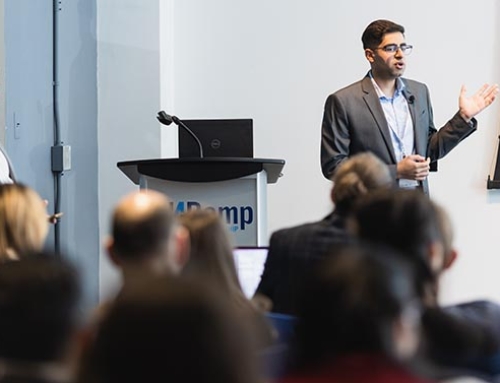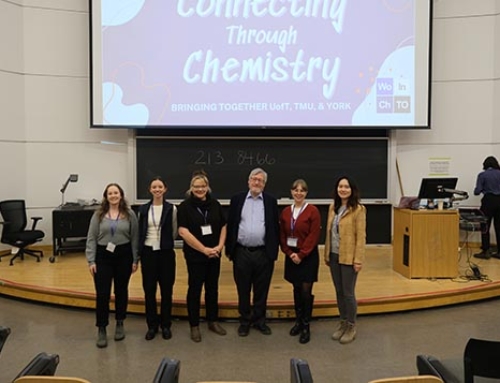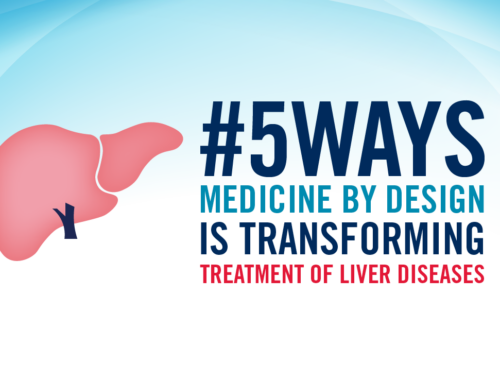
Brian Huntly (left), professor at Wellcome-MRC Cambridge Stem Cell Institute, University of Cambridge (U.K.), and Gary Bader (right), Donnelly Centre for Cellular and Biomolecular Research, University of Toronto, are two of the investigators participating in the doctoral exchange.
Thanks to funding from Medicine by Design, labs based in Toronto and the U.K. are partnering to offer a unique graduate student training opportunity that will have a global impact on the understanding and treatment of leukemia.
Researchers from the University of Toronto (U of T) and the affiliated University Health Network (UHN) are partnering with researchers at the University of Cambridge (Cambridge) and University of York to offer an International Doctoral Cluster (IDC). This student exchange is supported by Medicine by Design in partnership with the Office of the Vice-President, International, at U of T, and is led by John Dick, a senior scientist at the Princess Margaret Cancer Center, UHN.
“The International Doctoral Cluster takes an already-existing partnership between U of T, UHN, Cambridge and University of York and integrates these teams even further. With this partnership, we’re reaching far beyond our borders and bringing international groups together to have a real impact on human health,” says Michael Sefton, executive director of Medicine by Design and a University Professor at the Department of Chemical Engineering & Applied Chemistry and the Institute of Biomedical Engineering at the University of Toronto. Sefton’s lab is located at the Donnelly Centre for Cellular and Biomolecular Research. “International partnerships like this one ensure that global regenerative medicine hubs like U of T and Cambridge not only share knowledge, but also proactively work together to help solve some of humanity’s most challenging health problems.”
The doctoral exchange — which is now taking place virtually until international travel becomes more feasible — is part of a larger partnership between the institutions called the Leukemia Consortium. The goal of the consortium is to generate a comprehensive data set pertaining to human blood stem cells and the leukemia that originates from them.
Having access to combined data will accelerate both institutions’ research programs and enable shared collaborations between the groups. Moreover, through the creation of a public, comprehensive platform, this partnership will become an invaluable global tool for leukemia researchers.
Dick, who leads the Toronto team that is participating in this exchange, is renowned for his pioneering work on cancer stem cells, and he leads one of Medicine by Design’s large team projects.

John Dick, senior scientist at the Princess Margaret Cancer Center, University Health Network, leads the Toronto team that is participating in this exchange.
“This is a powerful training experience for the PhD students who participate,” says Dick. “They will have the chance to work with another lab either at U of T or Cambridge. This opportunity not only strengthens the consortium through the direct exchange of knowledge, but also allows the student to grow their connections and be immersed in a different lab environment, broadening their professional experience and mentorship opportunities.”
Along with Dick’s lab, other labs that will be participating in the student exchange are those of Gary Bader, professor at the Donnelly Centre for Cellular and Biomolecular Research, and Mathieu Lupien, senior scientist at the Princess Margaret Cancer Centre and an associate professor in the Department of Medical Biophysics at the University of Toronto. The U.K.-based researchers who are participating are Elisa Laurenti and Brian Huntly from the Wellcome-MRC Cambridge Stem Cell Institute (Cambridge) and David Kent, an investigator at the York Biomedical Research Institute, University of York.
The consortium has a successful track record of collaboration spanning more than five years. Most recently, Medicine by Design funded a special project between the teams, which seeded this International Doctoral Cluster. The special project emerged from a Medicine by Design-sponsored workshop in October 2019 that brought together investigators from UHN and U of T with U.K.-based investigators from Cambridge and York, to build on their five-year collaborative history, which includes publications in Nature in July 2018 and July 2017.
“This International Doctoral Cluster will give us a chance to further connect on our labs’ common goals, and add to our research successes,” says Cambridge-based investigator Huntly. “The work of the consortium is very focused on transformative research in the area of blood stem cells and leukemia, and this doctoral exchange program will help accelerate our research program by integrating our teams of talented students.”
International Doctoral Clusters connect talent from around the world with the aim of facilitating transformational innovation and ideas. They are facilitated by U of T’s Office of the Vice-President, International, and create opportunities to recruit talented graduate students to U of T and its partner institutions. These exchanges provide recruited students with extraordinary access to mentoring by a global network of leading researchers.
“We’re pleased to partner with Medicine by Design to support this International Doctoral Cluster between U of T, UHN, Cambridge and University of York. It’s an outstanding global opportunity for talented PhD students in the regenerative medicine field.” says Alex Mihailidis, Associate Vice-President, International Partnerships and a professor in the Department of Occupational Science and Occupational Therapy. “Recently, U of T and Cambridge signed a memorandum of understanding to further academic links, collaborative research, and the exchange of scientific materials. This International Doctoral Cluster further deepens our ties with Cambridge, a global leader in education and research excellence.”
Mihailidis points to other aspects of the partnership with Cambridge like a joint Initiative in German and European Studies (JIGES); collaborative activity within the U7+ Alliance of global universities; and U of T’s membership in the University of Cambridge’s Faculty of Law Herbert Smith Freehills Global Visitor Program.





